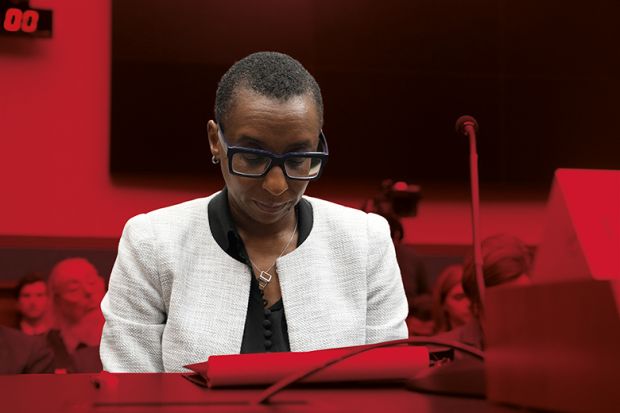The resignation of Claudine Gay as president of Harvard University is another milestone in Congressional conservatives’ campaign against elite universities that they claim have not done enough to combat rising antisemitism on campus.
The institutions are threatened with punitive measures unless they and their constituencies change their tone and posture. Among these are withholding government funds, taxing endowment income, ending federal financial aid for students and terminating universities’ tax-exempt status.
Both heavy-handed and ill-conceived, these forays into higher education will only make matters worse. However well-intentioned some lawmakers may be, such moves will give rise to perceptions of partiality to some victims of offensive behaviour, double standards relative to others, and political meddling in university affairs, thereby hardening the attitude of campus activists.
A better approach is to work with university leaders, within their system of governance, to foster a climate of greater civility, respect and tolerance on campus. University leaders can achieve this by collaborating with trustees, faculty and students to reform their codes of conduct.
For the most part, these codes are vague, narrow in scope and ineffectual. They fail to discourage certain types of offensive behaviour and to set reasonable limits on free speech. In addition, they lack teeth. They articulate rules of conduct without providing an effective mechanism for enforcing them. As a result, they have not succeeded in promoting the safety and well-being of all members of the university community, especially in politically turbulent times.
For example, while decrying discrimination, harassment and sexual misconduct, Harvard’s code of conduct fails to condemn “hate speech”, such as callous calls for genocide or ethnic cleansing. “[S]peech not directed at individuals in a harassing way”, it cautions, “may be protected by traditional safeguards of free speech, even though the comments may cause considerable discomfort or concern to others in the community.”
This explains Gay’s notorious statement at a December congressional hearing on universities’ responses to pro-Palestinian demonstrations that calling for the genocide of Jews would violate Harvard’s code of conduct only in contexts where the speech “crosses into conduct that amounts to bullying, harassment, intimidation”: speech directed against groups, rather than individuals, does not qualify.
Similar statements were made by the other two university presidents in the hearing, the Massachusetts Institute of Technology’s Sally Kornbluth and the University of Pennsylvania’s Elizabeth Magill, the latter of whom also later resigned.
The MIT Code of Conduct rightfully upholds “freedom from unreasonable and disruptive offense”, but fails to explain what constitutes an “offense”. Moreover, it offers a lame remedy to potential victims: they should “consider speaking up promptly and in a civil fashion, and should be able to ask others to help them in a professional fashion to express concern”.
Although Penn’s code explicitly condemns “hate speech, epithets and racial, ethnic, sexual and religious slurs”, it gives potential victims no remedy or recourse: “The content of student speech or expression is not by itself a basis for disciplinary action.”
These shortcomings fly in the face of the argument that a college or university is, or should be, an ethical authority, not just a source of knowledge. As such, it should hold its constituencies accountable for behaviour that falls short of high ethical standards.
Explicit prohibitions should be articulated of “hate speech”, such as antisemitic, Islamophobic, sexist, racist or homophobic recriminations that threaten the safety and well-being of members of the university community. Wanton calls for crimes against humanity, such as genocide or ethnic cleansing, should also be disallowed.
Second, we need specific guidelines for civil discourse, debate and dissent, including a requirement that public events be allowed to proceed without disruption and that members of the university community be given an opportunity to air dissenting views, either before or after events.
Such provisions would partly address the concerns of lawmakers who believe that publicly funded universities allow for the airing of some views but not others and turn a blind eye to “hate speech”. Applicable without distinction to all members of the university community, the rules would not come across as being partial to some victims of offensive behaviour. Equally important, they would help to foster a climate of greater civility, respect and tolerance.
Furthermore, American universities should carefully weigh what consequences should ensue from code violations. Depending on the seriousness of the offence, the penalties could range from barring the offender from participating in extracurricular activities to outright expulsion. In this regard, university leaders should distinguish between a “teachable moment” and a criminal offence. They should take into account that, ideally, an educational institution should be a place where students can safely fall, pick themselves up and learn from their mistakes.
Institutional autonomy is what distinguishes Western universities from their counterparts in authoritarian countries. Political meddling risks eliminating this distinction and aggravating an already bad situation.
Admittedly, Congress has a legitimate interest in ensuring that all members of the university community are treated fairly, can air their views freely and are not subject to physical harm or verbal abuse. By the same token, it also has a compelling interest in seeing that higher education remains at the forefront of intellectual progress, which is predicated on institutional autonomy and academic freedom.
University leaders should recognise these interests and work with both lawmakers and their internal constituencies towards achieving the underlying aims.
Richard J. Joseph is a senior consultant for the Association of Governing Boards of Universities and Colleges (AGB) and is a past president of Babson Global, a wholly owned education subsidiary of Babson College.
Register to continue
Why register?
- Registration is free and only takes a moment
- Once registered, you can read 3 articles a month
- Sign up for our newsletter
Subscribe
Or subscribe for unlimited access to:
- Unlimited access to news, views, insights & reviews
- Digital editions
- Digital access to THE’s university and college rankings analysis
Already registered or a current subscriber? Login







